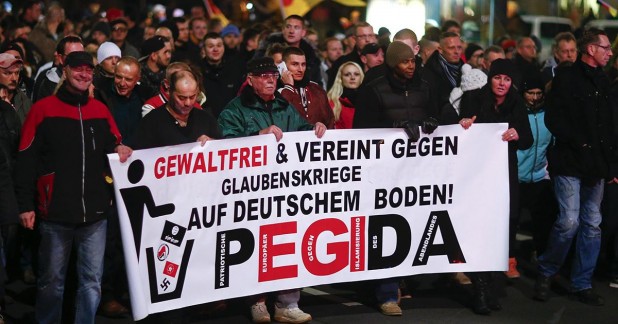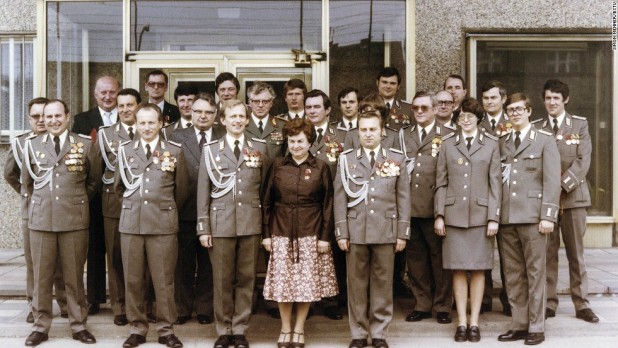Francis Carr Begbie
Occidental Observer
October 6, 2015

For professional German “anti-racist” Anetta Kahane, last week was a very good week. For one of her many organisations is slated to lead the campaign to shut down opposition to the immigrant invasion on Facebook.
This clampdown on Facebook free speech is now one of the German government’s highest priorities following a meeting between between Angela Merkel and Mark Zuckerburg, and means that henceforth all criticism of the immigrant invasion will be severely curtailed. Such a vast initiative will need an army of loyal and trusted functionaries, and who better but Ms Kahane and her Network Against Nazis. (“Netz gegen Nazis”) to show they mean business. Just to make sure ordinary Germans get the message the government have charged the leader of the dissident PEGIDA movement for anti-immigrant comments he made on Facebook.
In the lucrative anti-racism sector, Anetta Kahane is without doubt a shrewd and far-seeing operator. She recognised earlier than most that there were huge amounts of money to be had by re-packaging ordinary people’s concerns about immigration into “Neo-Nazi” scares, and she worked hard to ramp up this industry and turn it into the money-making machine that it is today.

Like so many Jewish leaders in Europe these days, Kahane is quite brazen in expressing her wish for the destruction of White Europe. “You have to really change the policy of immigration inside Europe. This is very important; you have to change the educational system and the self-understanding of the states. They are not only white anymore or only Swedish or only Portuguese or only German. They are multicultural places in the world.”
It was her founding of an organisation called the Amadeu Antonio Foundation in 1998 that has been her springboard to fame. This well-funded outfit aims to smear and defame all White resistance to immigration as “neo-Nazi” and works closely with magazines such as Stern and Die Welt to that end. Modelled after the Stephen Lawrence campaign in the UK, it receives lavish funding from the German government, the EU and a host of international NGOs including the Ford Foundation.
Her work has earned her a huge profile, and she is frequently sought out by the media for her views. She is not slow to oblige. Except, perhaps, when it comes to one matter.
This is her role as a collaborator for the Stasi or East German Ministry of State Security between 1974 and 1982. From the age of nineteen, Kahane — codename: “Victoria” — was an enthusiastic informer or inoffiziele Mitarbeiter (IM) and submitted monthly secret reports on the political reliability of dozens of fellow students, journalists, actors and writers she mixed with.

Her own file shows her controller considered her to be zealous and reliable. Her role as a trusted informant in the state apparatus meant privileges denied to ordinary East Germans such as foreign travel. At the East German embassy in Mozambique she worked as a translator and informed on her colleagues there. She was paid in money and “gifts” for her services.
Collaborators like Kahane wielded a terrible power. The spraying of graffiti or even written criticism of the regime could result in years of imprisonment and hard labour. A wrong word out of place and a career could be blighted forever.
She was far from the only one. John Koehler, author of The Stasi, estimates that if part-time collaborators were included, there could have been one for every 6.5 citizens, far more than were used in Nazi Germany. Only North Korea has imposed a comparable level of surveillance over its citizens.
Another prominent East German Jew was also unmasked as a Stasi IM informant. His name is Gregor Gysi; TOO readers may remember the YouTube video of this man gloating at the prospect of the race-replacement of Germans by immigrant invaders. (See also this article by Max Blumenthal, a critic of Israel. Blumenthal writes that Gysi “felt compelled to engineer the campaign to suppress our speech.” White advocating the destruction of ethnic Germany, Gysi is nothing if not a Jewish patriot.)
After reunification, Gysi tried to persuade the former Soviet authorities to hide or destroy the Stasi files identifying collaborators like himself. Ultimately he failed, but he has since fought a vigorous legal battle to suppress discussion of his time as a Stasi informant. He has bounced back from this humiliation, and today is the leader of the left-wing Die Linke (“The Link”), Germany’s third largest party.
As with Anette Kahane, Gregor Gysi enjoyed a privileged upbringing as the offspring of a senior Jewish Communist Party apparatchik. Gysi’s father Klaus was a member of the Politburo and a close friend of East German leader Erich Honecker. Klaus Gysi enjoyed a number of senior foreign postings including ambassador to the Vatican.
And they were far from the only ones. German Jews flocked to East Germany after the war and many enjoyed a rapid rise through the Party machinery. As in the Soviet Union in the early decades and throughout Eastern Europe after World War II (e.g., Poland; see here, p. 66), Jews became prominent in the security police. An infamous example is Colonel General Marcus Wolfe, chief of the Stasi’s foreign espionage directorate.
Jews were important cogs in the apparatus of communist oppression because they were not ethnically German and thought by Moscow to be therefore more trustworthy. It was a role for which there are many historic parallels — the Jews as loyal overseer for a foreign ruler, over a sullen, unwilling population.
After the Berlin Wall fell in 1989, there was a huge cry for justice against the communists. But the pursuit of this justice was a halting affair. Many of the guilty escaped punishment as their cases became stalled and abandoned. This is in stark comparison with what happened at the end of World War II when the East Germans arrested so many of their own citizens they had to re-open or establish eleven concentration camps including Buchanwald and Sacksenhausen.

In the five years after 1945 some 160,000 Germans disappeared into these camps. Of these about 65,000 died, 36,000 were shipped to the Soviet Union, and 36,000 were freed.
For though many Jews obviously enjoyed a privileged existence in the former East Germany, they now insist their lives were blighted by an anti-Semitism every bit as bad as anywhere else.
As far as Anetta Kahane is concerned, in East Germany she was a victim too, forced to conceal or bury her Jewish identity. But in fact socialist dogma frowned on all as an outmoded construct that belonged in the dustbin of history.
Kahane typifies the deceptive and often self-deceptive nature of Jewish identification under communism (see above link, passim), noting “My parents were Marxist-Leninists and had nothing to do with religion. But my father liked to talk about his grandparents, which was for him the romantic side of Judaism.” But here is a curious paradox — where religion in submerged, ethnic identity typically remained intact. For while many Jews pled persecution, they seem to have had no problem pursuing specifically Jewish ethnic causes and preoccupations.
Kahane’s father, the famous journalist Max Kahane, is a case in point. He covered the case of Adolf Eichmann, the alleged Nazi war criminal. Institutional East German “anti-Semitism” did not stop him from covering this story from beginning to end and journeying from Argentina to the trial itself in Israel.
Another Stasi IM collaborator was the head of East Berlin’s Jewish Community Dr. Peter Kirchner. Although publicly a strong supporter of Israel, he was also an informant, known to his controller as “Burg.” He does not seem to have suffered.
Jewish historian and documentary filmmaker Helmut Eshwege is yet another. Throughout his time in the GDR he was a vocal supporter of Israel, and in his autobiography, claimed to have suffered greatly from anti-Semitism. It’s a shame that in this book he did not feel able to write about his role as a Stasi informant called “Ferdinand,” which was revealed afterwards. (At his last meeting with his controllers on 15 November, 1989 he handed over the constitution of the new left-wing party which was to replace the communists).
There are numerous similar examples. Take Kahane and Gysi’s old comrade, distinguished writer Stefan Heym. Having sat out the war safely in the United States he returned to East Germany and a distinguished writer’s position, as a fanatical cheerleader for the regime. After the death of Stalin he wrote of how the murderer of tens of millions was “the most loved man of our times.” After reunification he lost no time in rediscovering his Jewish victimhood card. In 1995 he said “the political climate is very similar to that of 1933, and this frightens me.”
So where was the East German anti-Semitism? The more this issue is teased out, the more it seems obvious that Jews were not singled out for persecution but at the same time were not given the special status they felt they deserved as the self-styled “pre-eminent victims” of the Holocaust. In East Germany it was taught that it was communists who were singled out by the Nazis.
Two East German policies, in particular, grated with Jews and have been
described as Anti-semitism. One was the GDR’s refusal to recognise Israel — which was consistent with their position of opposing US-backed colonial power.
The second was East Germany’s refusal to pay Holocaust reparations. While
Israel received vast subventions and armaments from West Germany after
1945, the East refused to pay a dime. This infuriated the Jews who ascribed both these positions to “anti-Semitism.”
Both Anette Kahane and Gregor Gysi have made an effortless transformation into pillars of the new progressive Germany and have achieved great success. They both shrugged off their past as “informers” and prefer to concentrate on the present and how the stain on German society can only be removed by the mass immigration of alien hordes from the Middle East.
The eradication of White Germany is not their only enthusiasm. They are both tireless defenders of Israel and are quite willing to hound and harass and purge not just their own left-wing comrades, but even other Jews who do not toe the line.
Gysi declared Anti-Zionism can no longer be an acceptable position for the left in general, and the Die Linke party in particular. He has echoed the words of Angela Merkel in saying that “solidarity with Israel” as an essential component of Germany’s “reason of state.”
He has led campaigns against fellow Die Linke members accused of supporting the BDS (Boycott, Divestment, Sanctions) campaign against Israel and also of those who joined the Free Gaza Flotilla. His campaigns have been successful and resulted in cancelled speaking engagements and withdrawn bookings for “Holocaust Industry” author Norman Finkelstein and Israel critic Illan Pappe, both notable dissident Jews.
As for Anetta Kahane, what effect did her reports have on the lives of the people she denounced? A good example might have been the talented young actor Klaus Brasch who, together with his brother Thomas, met Kahane in 1976.
Her confidential report on them contained the following sentence. “The enemies of the GDR primarily include Klaus Brasch and Thomas Brasch.” It would be interesting to ask Klaus Brasch about the effects that Kahane’s reports had on their careers but sadly that is not possible. Thomas Brasch died of a heart attack in 2001. His brother Klaus died from an overdose in 1980.
 Daily Stormer The Most Censored Publication in History
Daily Stormer The Most Censored Publication in History


